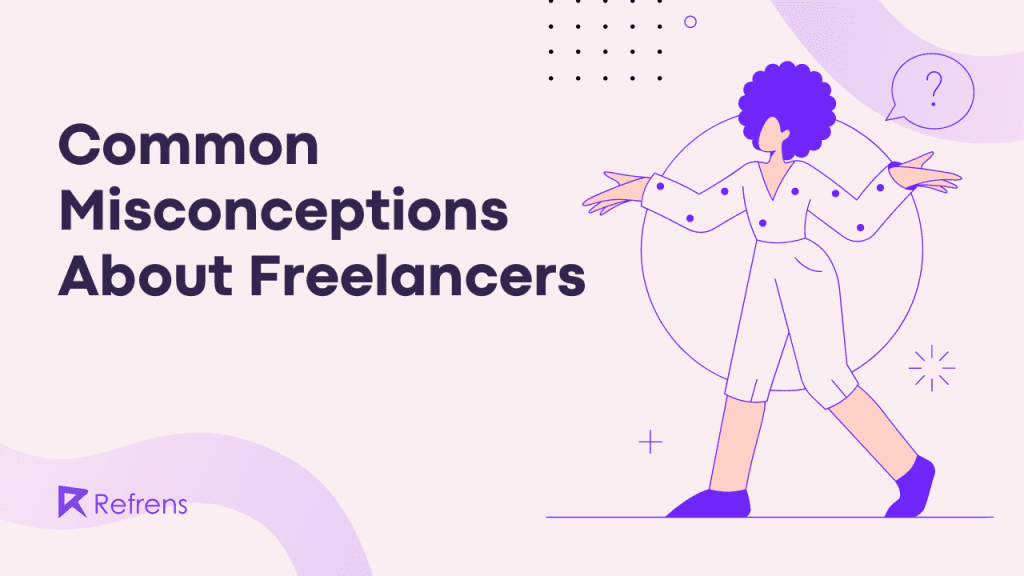Misconception: Working As A Freelancer Makes You Socially Uneasy
The truth is that some people are simply awkward. Working as a freelance writer, artist, or corporate headhunter does not eliminate your social life, any more than working in a large office does not make you popular.
Learn how you can be a professional content writer in India!
Misconception: Freelancers Are Self-Employed Individuals Who Work From Home
Although this is appealing to many individuals, the reality is that where you work is determined by what you do. Some freelance researchers are required to visit archives, dine at restaurants for restaurant reviews, conduct interviews, and attend work-related gatherings. Your perception is the only thing that limits you.
Moreover, Freelancers can work from cafes, co-working spaces or anywhere they feel productive
Misconception: Freelancers Get Paid Less
This isn’t always the case; many freelancers earn more than their salaried peers. Everything is contingent on the market and the quality of your work.
Over and above if you are new to freelancing, check how can you price your first-time customers.
Misconception: Freelancers Have No One To Answer To
This is one of the most common misunderstandings. Your client is your boss for the duration of a project. You don’t get paid if the client isn’t happy!
Misconception: Freelancers Are Able To Earn More Money
It depends on your field and how in demand your talents are, just as in the prior fallacy. To establish a good work history, you may need to build a reputation and accept lower-paying jobs at first.
Moreover, learn how you can raise your prices as a freelancer.
Misconception: Freelancers Don’t Put In The Same Amount Of Effort As Everyone Else
Finding good work can be difficult, and unless you’re lucky enough to land a long-term, high-paying contract right away, you’ll be spending half of your time bidding on positions. You must always improve your abilities in addition to the job search grind. It’s a cutthroat business, and if you don’t improve your skill set at least once a month, you’ll miss out on job possibilities.
Misconception: Working As A Freelancer Is Always Fascinating
Freelancing, like any other profession, may become monotonous. It also frequently entails a great deal of administrative work that isn’t always related to the profession you enjoy.
Misconception: Employee Benefits Are Not Available To Freelancers
You could be shocked by what you see in the portfolios of the more experienced freelancers. Just because someone doesn’t have a standard 401K doesn’t imply they don’t have access to good health care or long-term investments.
Misconception: Freelancing Is Not A Legitimate Profession
Tell the IRS about it! Freelancers are classified as independent contractors and must file a 1099-MISC or comparable tax form.
Filing ITR as a freelancer? Check out this guide to learn how to do it correctly.
Misconception: Freelancers Should Do Their Labor For No Charge
Thousands of posts encourage freelancers to “do it for the love” or seek exposure in exchange for money. That is not only disrespectful, but it also encourages low-quality work.
Misconception: Freelancing Is Harmful To Enterprises. In Fact, The Inverse Is True
Small businesses that cannot afford to hire full-time staff may have to rely on contract employment to stay afloat. It also boosts the economy by allowing more people to take part in the free market.
Misconception: Every Freelancer Wishes For A “Regular” Job.
While some people perform contract work to augment their income, there is an increasing number of people who prefer to work for themselves. It appeals to the millennial population, non-traditional families, and entrepreneurs in particular.
Misconception: Freelancers Face Numerous Challenges.
Every work entails some level of struggle. People perceive this form of labor to be difficult since it lacks steadiness. They believe that freelancers move from job to job every month and do not have a consistent income. Freelancers, on the other hand, are knowledgeable enough to try a range of jobs based on their skills and know-how to manage their finances.
Going to work and returning home with a predetermined payment at the end of the month is clearly not a regular habit. It is a place with many alternatives, and income becomes fascinating as a result.
Misconception: Freelancing Restricts One’s Ability To Grow.
This is a serious belief held by those employed in regular occupations. They believe that working outside of the standard working system will impede their professional advancement and that they will be forced to stay at their current level. This is a big fallacy, given the flexible options and diverse areas of expertise available in the market which leads to successful freelancers.
Freelancing is, in fact, a big business with limitless growth opportunities, where expertise and imagination are your only saviors.
Conclusion
Not everyone is suited to freelancing. Learning the ropes that lead to success as a self-employed business owner takes time, energy, and perseverance. However, thanks to greater resources and community support accessible to those ready to take the plunge, freelancing is also on the rise. Fortunately, as the number of people who consider themselves freelancers grows, many of these misconceptions are beginning to be dispelled.
Recommended Reads: Top Invoicing Software For Consultants


















